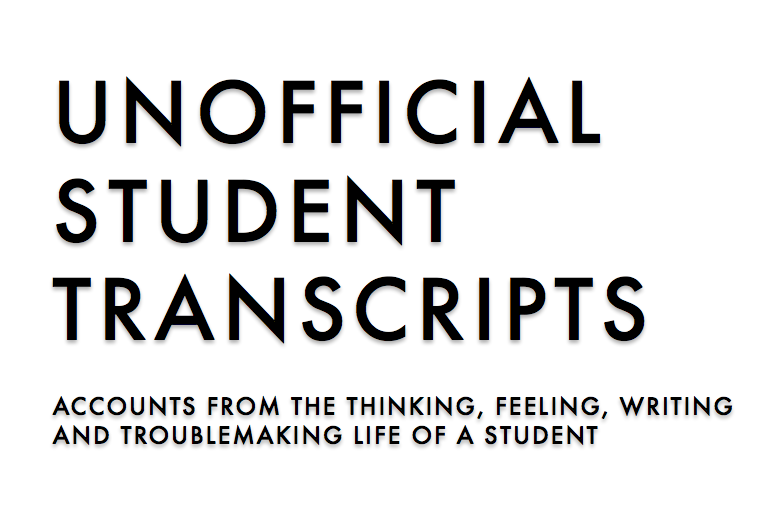
On Saturday night I finally “finished” my series of accounts/book, Unofficial Student Transcript, and submitted it for e-publication at iBooks Author. It’s currently under review. As I wait for it to be available in iBooks, I thought I’d post a few accounts from it on this blog. Here’s my conclusion:
if not this, then what?
not a haunting question, but
an invitation
If not this, then what? If I can’t be an academic, what can I do with my training and my intellectual curiosity? What else is there besides teaching and researching at a college or university? For years, while working on my Ph.D and then after graduating, these questions haunted me. I felt as if the only thing that I was qualified to do was teach and research within academic spaces. In my darkest days, after sending out scores of job applications for tenure-track and visiting professor positions and getting rejected repeatedly, the panic and sense of hopelessness would creep in.
Luckily I did manage to find a good, albeit temporary, job as a part-time ad- junct and then full-time Visiting Assistant Professor at the University of Minnesota in the Gender, Women and Sexuality Studies Department. I taught at the University from fall 2006-fall 2011. I was really excited when I was offered the three year position. My own office! Benefits! A lot more money than I made as an adjunct! Great classes to teach!
Getting a full-time academic job before my mom died (I started this position in fall 2008, she died a year later in fall 2009) was very important to me. She was the one I talked to about all of my failed job searches and she could commiserate, having experienced 4 (!) decades of agonizing academic job searches as the wife of an academic administrator. I know that she was very proud of me.
While I was at the University of Minnesota, I experimented a lot with how I taught (my style, strategies, assignments) and what I taught (topics and type of content). And, I learned a great deal about feminist pedagogy, queer theory and digital media as I worked to stay one step ahead of all of my students. I learned so much that it feels as if my time at the university was as a student and a teacher. This is the kind of teacher I like to be: one who is always engaging, encounter- ing new ideas and participating in the learning process with my students.
But, my job was temporary; I was under constant threat of not having my contact renewed. And, I was repeatedly reminded, in big and small ways, that I wasn’t a real member of the faculty. I couldn’t vote, I couldn’t apply for grants and I was (just) a visitor who would eventually leave and therefore wasn’t worth investing any time in. With their super busy schedules and the constant demands placed on them by administration, other faculty members, and students, faculty members in my department didn’t have time to invest in me and my future as an academic. They barely had time to eat or sleep or deal with their own personal struggles with serious illness and aging and dying parents. Plus, they had stronger investments in and commitments to their graduate students; placing graduate students in tenure-track jobs meant higher ratings for the department and more status. These ratings were important for ensuring that the department wasn’t consolidated (“hubbed”) when budget cuts came rolling in.
Regardless of why it happened, I was made to feel like I was less than the tenure-track and tenured members of the department. That felt uncomfortable, demoralizing and wore me down physically and mentally. By the time I finally left the University in 2011, I had extreme doubts in my abilities as a scholar, a thinker and a teacher. Was I fooling myself that my new research and teaching in and with digital media was interesting and innovative?
Now that I’ve been on a break from teaching and researching in the academy for over a year now, I’m not as haunted by the questions, What can I do besides teach in the University? and If not this, then what? I’d be lying if I said that these questions didn’t still haunt me a little. My break has provided me with some much needed critical distance. And I’ve realized that my perspective on being an academic has shifted.
When I first went on the job market, I wondered whether or not any institution would want me. Was I good enough? Smart enough? Did I fit with their interests and personality types? Now, having spent so much time immersed in femi- nist and queer theories, reading, writing and teaching about limits, failure and the value of troubling and being troubled, and having spent six years working Post-Ph.D and experiencing the hierarchies and damaging myths of the AIC, I wonder whether or not I want to be at any institution. Are the drawbacks of academic life—the push to ruthlessly compete instead of collaborate with others, the demand to prioritize your academic work over the rest of your life, the constant reminder that your work will never be good or rigorous enough, the threat that only certain work counts as real academic work and only certain people count as real scholars—worth it?I’m sure that there are many pockets of resistance where scholars are collaborating with each other and, more importantly, with community members outside of the academy, on cool and important projects. Or where wonderful scholars find ways to continue to be joyful and passionate about their work within academic spaces and, by virtue of that joy and their generous spirit, transform those spaces and those who inhabit them in amazing ways. Actually, I know that these folks exist, even if they are rare. One of my favorite people from graduate school at Emory University, Dr. Kristi McKim, is just such a scholar.
When I start to wonder if I could be one of those scholars some day, when my kids are older and I’ve managed to figure out how to be a person and a scholar at the same time (ha!), I pause. Maybe. Maybe I could recapture the love and passion that I’ve had for so long for the academy again. But, maybe not. When I think about the disciplining, the push to professionalize, the elitism, the gatekeeping and the entrenched resistance to new forms of scholarship, I’m not sure the academy could ever be a place that welcomes my undisciplined and troublemaking practices and perspectives.
But questions about my future in the academy aren’t as urgent for me right now and I’m not as anxious about what kind of present or future I can have outside of the academy. Instead, I understand the question, “If not this, then what?” as a (mostly) exciting invitation to imagine new possibilities and ways of being an intellectual, a student, a storyteller, and a person who has lots of interesting conversations.

